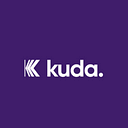Your Money On Our Mind
It’s natural, your heart is usually where your money is.
Now, if you’re not sure that place is safe, it’s not likely that you’ll have any peace.
So we understand why people ask us questions like:
“Where’s your office?”
“Do you have a vault for everyone’s money?”
“How do I know my money is safe with your bank?”
They just want to be sure.
And because we use Kuda ourselves, we feel the same way.
But beyond sharing your feelings, we’ve built you a bank that gives you peace about your money.
(Sometimes, we even try so hard to protect you that we annoy you with a locked account.)
These are some of the ways we keep your money where it belongs — in your hands and no one else’s:
1. Encrypted Accounts
Let’s get the most technical stuff out of the way first.
Encryption is basically coding information, like ‘talking’ to your friend with signals so no one else knows what you’re saying.
We use a high level of encryption to protect all your financial information from being accessed by people we’d rather not speak of.
This probably doesn’t explain much but it wouldn’t be encryption if we told you exactly how it’s done.
2. Fraud Prevention
We admit, we have a really sensitive fraud prevention system. It’s like a touchy teenager sometimes.
This automatic system has a set of unbiased filters to catch what we call ‘suspicious activity’ (explained in detail here).
When it picks up on anything suspicious about an account, it locks it right away and sends a message to the owner of the account with steps to unlock it.
Never has the expression, “Better safe than sorry” been more appropriate.
Translation: We’d rather lock your account for safety than have to send you a ‘Sorry Your Money Vanished’ email.
3. Passwords, PINs and Biometrics
These security cousins do one thing pretty well: Keep the wrong people out.
There’s your Kuda password which you set when you’re opening your account.
Then there’s your Kuda PIN for signing in to your account on the day to day, your transaction PIN for authorising payments and your card PIN for you know what.
There are also biometric login options, aka Face ID and fingerprint, which can replace PINs for signing in to your account and authorising payments because who has the time to cram numbers?
Note: This should go without saying but you must never share your password and PINs with anyone. Please.
4. Private Mode
Security isn’t always about hiring a buff guy who wears sunglasses at night and yells at people.
Sometimes, it’s way more subtle.
Like driving casually past your house because you don’t trust the car that has been following yours since you left the supermarket. (Turns out it was your best friend from secondary school.)
Like Private Mode on Kuda.
Turn it on and you’ll confuse prying eyes with a ‘remixed’ or hidden account balance.
5. Insurance
This one’s not exclusive to us — any bank you use is required by law to insure your money.
The government agency that handles this is called the National Deposit Insurance Commission or NDIC for short because what’s a government agency without an abbreviated name?
If your bank takes a hit and is wiped out, the NDIC has a Deposit Insurance Fund that’s required to pay you a compensation of 200,000 naira for the expected emotional and financial distress.
Last resort aside, we hope you’re convinced your money is safe with us.
If you have any questions about security, please send us a message on the app or send an email to help@kudabank.com.
We’re here for you. 💜
